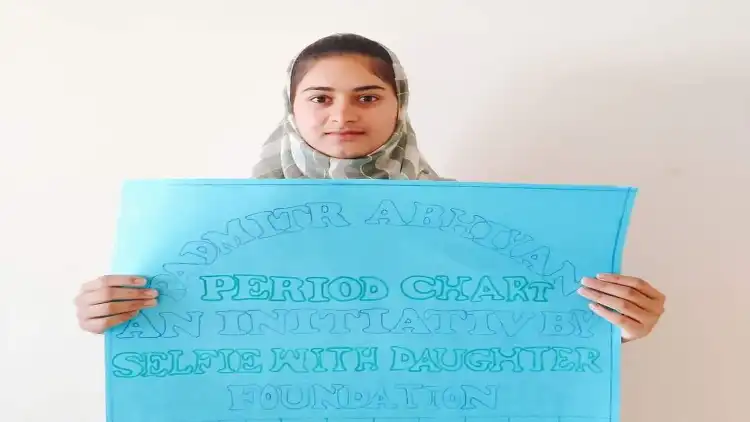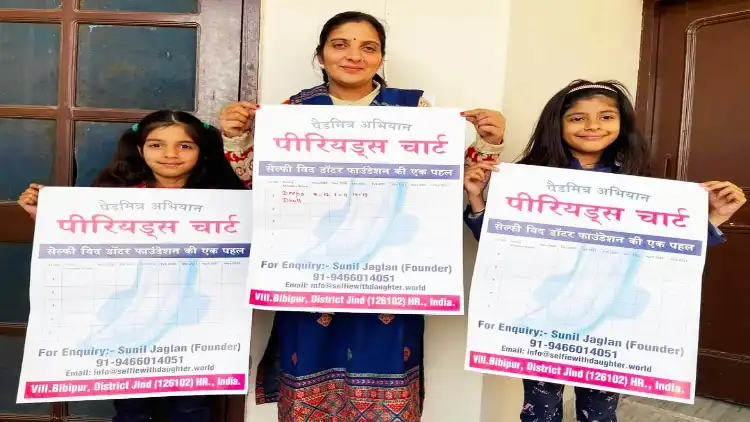
Shahnawaz Alam / Nuh
Periods… a word that men and women too, hesitate to talk about. The biological function of a woman’s body that it refers to is something that everyone starts getting uncomfortable hearing. Even girls and women are shy of talking about it openly.
The taboo of periods is detrimental to women’s health as it’s considered some sort of shame and no attention is paid to a woman’s special needs of personal sanitation in those three to five days of the month.
Interestingly, a unique initiative to break this taboo has started in Mewat, a Muslim-majority district of Haryana which is considered among the socially backward pockets of India. The Selfie with Daughter Foundation has launched a 'Menstrual Chart' campaign to address the problems faced by adolescent girls and women during menstruation. It makes the whole family, including menfolk, to take care of the women in those five days.
In this campaign, families are encouraged to maintain a menstrual chart that’s prominently displayed on the wall of the house.
Mewat takes lead
Haryana has taken a lead in discussing the ‘taboo’ subject openly. The campaign is especially targeted at sensitizing the men so that they can understand this natural process and take care of their daughters’ sisters or wives who suffer pain and discomfort during the period. Men are told to take care of the womenfolk on those days each month.
More than 1,000 families are now part of the campaign and its founders are continuing to rope in more people.

A mother with her daughters campaigns for period charts
Sunil Jaglan, founder of the Selfie with Daughter Foundation, told Awaz-the Voice that an American woman Mary Kenner was the first to make a sanitary napkin for use of menstruating women in 1956. Jaglan says he launched the campaign on January 13 this year as it happened to be Kenner’s death anniversary. The campaign was launched with 150 families joining in from across the state to pay tribute to a pioneer for making women deal with those four days comfortably.
Jaglan says due to a lack of awareness about periods, woman suffer many health issues. “This is seen more of some kind of shame attached to a woman’s persona and not an issue about health and personal hygiene.”
He started this campaign to create awareness on these issues. In the period chart, the date of each month's period is written against the names of all the women members of the household. The idea is that menfolk of the family are made aware and they not only chip in with household chores in those days but also take responsibility for looking after their special needs.
Jaglan says that when he approached families, initially people are hesitant to talk. Gradually more people are joining in and he is happy with the results. School and college-going students and housewives have also joined in.
Gulfasha, a resident of Nuh, says that both she and her mother write period dates in the chart, “Earlier, I used to feel awkward, but now I feel comfortable. Our brothers have also seen this chart, they understand our suffering.”
Women speak up
Nishat Roon, a law student from Ferozepur Jhirka, says that sanitary pads are not much used in areas like Mewat. “We had to face a lot of trouble during our periods. This is a new and welcome beginning and we will definitely see changes in our lives because of the period charts of Selfie with Daughter Foundation.”
Anvi Aggarwal, brand ambassador of the Selfie with Daughter campaign, says that many women do not even get sanitary napkins because they feel shy of buying these from the marker. This campaign will bring a new social revolution.”
Dr. Pushpa Bishnoi, a gynaecologist and former Chief Medical Officer of Gurugram, says that period is a normal body function in women. “This natural practice gives her the status of a woman in society. This is the basis of the human race. There are four to five days of bleeding during periods. Many women also go through problems like swelling in the extremities, pain in the abdomen and legs, back pain, fever, loss of appetite and constipation.”
“At this time, women need special care and comfort. Many consider this natural law of women to be her weakness, which is a distortion of their mind,” she added.
In fact periods are generally seen as a shame in many north Indian societies, whileas in the South and north Eastern region, the woman's first period is celebrated as a feast. The girl is showered with gifts and dressed up like a woman.
